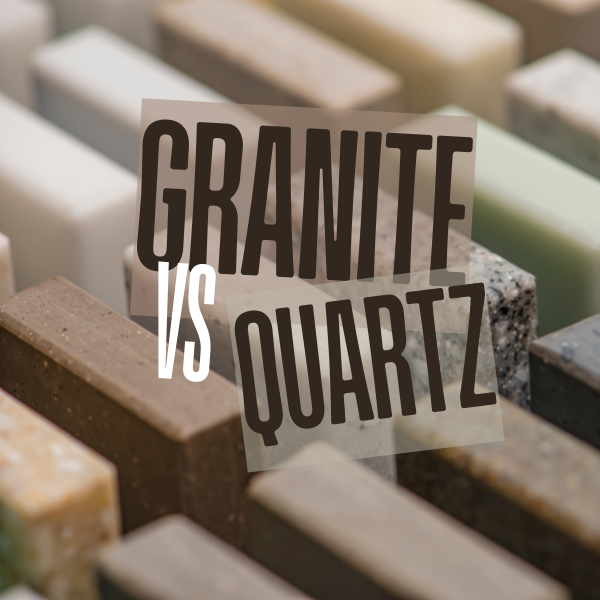When it comes to choosing countertops, two of the most popular options are granite and quartz. Both materials offer unique beauty, durability, and distinct features that make them attractive choices for homeowners. But which one is best for your space? In this guide, we’ll dive into the key differences of granite vs. quartz countertops to help you make an informed decision.
Material Composition
- Granite: Granite is a natural stone quarried from the earth, cut into slabs, and polished for countertop use. Because it’s a completely natural material, each granite slab is unique in color, pattern, and texture, giving a one-of-a-kind look to any space.
- Quartz: Quartz countertops, on the other hand, are engineered. They are composed of about 90-95% crushed quartz (a natural mineral) combined with resin and pigments. This blend makes quartz non-porous and gives it a more uniform appearance compared to granite.
Key Takeaway: If you prefer natural, unique stone patterns, granite might be the best option. For a consistent look and low maintenance, quartz could be ideal.
Aesthetic Variety
- Granite: Known for its natural veining, speckles, and variety of color options, granite’s beauty comes from its organic appearance. Since no two slabs are identical, granite countertops are especially attractive for homeowners seeking a unique, natural look.
- Quartz: Quartz countertops are manufactured, so they offer a more consistent appearance. They come in a wide range of colors, including options that mimic the look of natural stone (like marble and granite) while maintaining uniformity. This consistency can appeal to those wanting a more streamlined look.
Key Takeaway: Granite offers natural beauty and one-of-a-kind patterns, while quartz provides controlled color options and a sleek, consistent appearance.
Durability and Maintenance
- Granite: As a natural stone, granite is durable and heat-resistant. However, it is porous, which means it requires periodic sealing to prevent staining and protect it from moisture damage. Granite can chip if exposed to heavy impact, but its natural strength still makes it highly resilient.
- Quartz: Quartz is extremely durable and non-porous, making it resistant to stains, scratches, and bacteria without needing sealing. It’s also heat-resistant but not as much as granite; placing hot pots or pans directly on quartz countertops could lead to discoloration or damage.
Key Takeaway: Granite’s durability requires occasional maintenance, while quartz is highly resilient and low-maintenance, ideal for busy households.
Cost Considerations
- Granite: The cost of granite varies depending on the rarity and origin of the stone. Higher-end, rare granite slabs can be more expensive, while more common granite options are generally affordable.
- Quartz: Quartz tends to be slightly more expensive due to its manufacturing process, but it remains comparable to mid-range granite options. Additionally, its durability and low maintenance can make it a cost-effective choice in the long run.
Key Takeaway: If you’re on a tight budget, granite may offer more flexible options. However, if long-term durability is a priority, the investment in quartz can pay off over time.
Environmental Impact
- Granite: Since granite is quarried and transported as a natural stone, its environmental impact can be higher, especially if it’s sourced from faraway locations. However, some granite suppliers offer local or sustainably sourced options.
- Quartz: Quartz countertops are made with engineered processes, and many manufacturers prioritize environmentally friendly practices. Additionally, because it’s man-made, it reduces the need for large-scale quarrying of natural stone.
Key Takeaway: For eco-conscious homeowners, choosing a locally sourced granite or sustainably manufactured quartz can make a positive environmental impact.
Granite vs. Quartz: Which Should You Choose?
Ultimately, the choice between granite and quartz comes down to your preferences, lifestyle, and maintenance needs. Here’s a quick recap:
- Choose Granite if you love natural, unique patterns, want heat resistance, and don’t mind occasional maintenance.
- Choose Quartz if you prefer a consistent look, low maintenance, and enhanced durability with stain resistance.
At Natural Stone Fabrication and Design, we’re here to help you find the perfect countertop for your home. Whether you’re drawn to the organic beauty of granite or the practical elegance of quartz, our team can guide you through the selection process to ensure your new countertops are a perfect fit for your space.
Ready to get started? Contact us today to explore our beautiful granite vs. quartz options!
